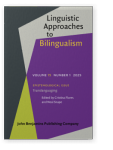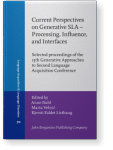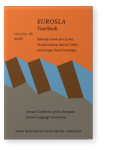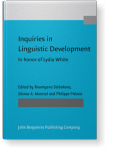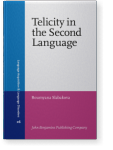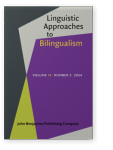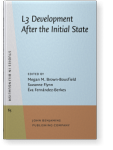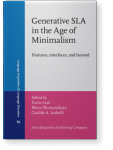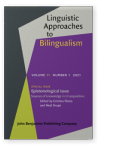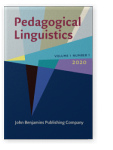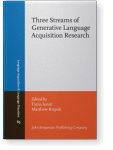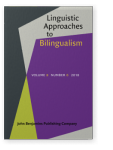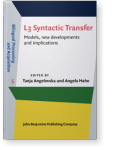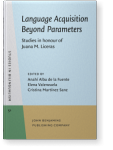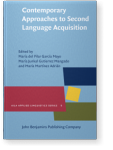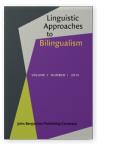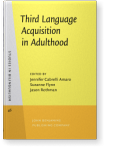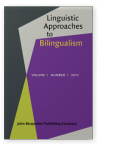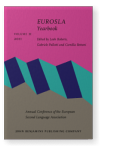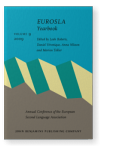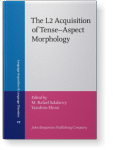Roumyana Slabakova
List of John Benjamins publications for which Roumyana Slabakova plays a role.
Journal
Book series
Yearbook
Titles
Inquiries in Linguistic Development: In honor of Lydia White
Edited by Roumyana Slabakova, Silvina Montrul and Philippe Prévost
[Not in series, 133] 2006. vi, 363 pp.
Subjects Language acquisition | Language teaching | Multilingualism | Theoretical linguistics
Telicity in the Second Language
Roumyana Slabakova
[Language Acquisition and Language Disorders, 26] 2001. xii, 235 pp.
Subjects Language acquisition | Semantics
2024 Null and overt pronoun interpretation in L2 Mandarin resultative constructions Linguistic Approaches to Bilingualism 14:2, pp. 178–217 | Article
This experimental study examines the acquisition of null and overt pronoun interpretations in Chinese as a second language by native speakers of English. A linguistic phenomenon not present in the native language of the learners is identified: the null element in the embedded subject position of… read more
2023 A shared linguistic system of multilingual representations L3 Development After the Initial State, Brown-Bousfield, Megan M., Suzanne Flynn and Éva Fernández-Berkes (eds.), pp. 29–48 | Chapter
This chapter discusses multilingual linguistic representations and probes the question of whether they form a shared linguistic system. Recent psycholinguistic and neurolinguistic studies of multilingual individuals suggest that this is indeed the case. Taking Minimalist morphosyntax and… read more
2022 A different type of RC attachment resolution: Comparing bilingual and trilingual processing Generative SLA in the Age of Minimalism: Features, interfaces, and beyond, Leal, Tania, Elena Shimanskaya and Casilde A. Isabelli (eds.), pp. 287–314 | Chapter
This study investigates attachment resolution of ambiguous relative clauses (RC) by second (L2) and third (L3) language speakers of English and Russian. Participants’ sensitivity to the language of testing, social conventions, and a linguistic effect of the matrix verb (perception, non-perception)… read more
2021 Does Full Transfer Endure in L 3 A? Epistemological issue: Sources of knowledge in L3 acquisition, Flores, Cristina and Neal Snape (eds.), pp. 96–102 | Commentary
2020 Aspectual contrasts in the English present tense revisited: Exploring the role of input and L1 influence Pedagogical Linguistics 1:1, pp. 66–93 | Article
This study investigates the acquisition of aspectual contrasts in the English present tense by French and Chinese learners of English at upper-intermediate to advanced proficiency levels. An oral production task and an interpretation task show that the expression of the aspectual present tense… read more
2019 The Bottleneck Hypothesis updated Three Streams of Generative Language Acquisition Research: Selected papers from the 7th Meeting of Generative Approaches to Language Acquisition – North America, University of Illinois at Urbana-Champaign, Ionin, Tania and Matthew Rispoli (eds.), pp. 319–346 | Chapter
The Bottleneck Hypothesis identifies parts of the grammar that are easier or more difficult to acquire in a second language. It argues that the functional morphology is the bottleneck in L2 acquisition because it bundles a variety of semantic, syntactic and phonological features that affect the… read more
2018 Back to our roots Epistemological issue with keynote article “A Formalist Perspective on Language Acquisition” by Charles Yang, pp. 776–781 | Commentary
2017 Chapter 3. Testing the current models of third language acquisition L3 Syntactic Transfer: Models, new developments and implications, Angelovska, Tanja and Angela Hahn (eds.), pp. 63–84 | Chapter
In this chapter, we argue that another factor should be brought into the general picture of third and additional language acquisition: the comprehensible linguistic input. Predictions of current models have been predominantly based on the cognitive-psychological prominence of the three languages… read more
2016 Not just algunos, but indeed unos L2ers can acquire scalar implicatures in L2 Spanish Language Acquisition Beyond Parameters: Studies in honour of Juana M. Liceras, Alba de la Fuente, Anahí, Elena Valenzuela and Cristina Martínez Sanz (eds.), pp. 125–145 | Article
This study examines interpretation of scalar implicatures (SI) in the L2 Spanish of native English advanced learners. Spanish is especially interesting since, unlike English, it has two indefinite determiners, unos and algunos, which ostensibly map to English some. However, each does not allow an… read more
2013 Chapter 1. What is easy and what is hard to acquire
in a second language: A generative perspective Contemporary Approaches to Second Language Acquisition, García Mayo, María del Pilar, María Juncal Gutiérrez Mangado and María Martínez-Adrián (eds.), pp. 5–28 | Chapter
Explaining why some linguistic features and constructions are easy or difficult to acquire in a second language has become a prominent current concern in generative second language acquisition (SLA) research. Based on a comparison of findings on the L2 acquisition of functional morphology, syntax,… read more
2013
This review article selects and elaborates on the important issues of adult second language acquisition research in the second decade of the twenty-first century. The fundamental question of whether adult second language acquisition and child first language acquisition are similar or different is… read more
2012 L3/Ln acquisition: A view from the outside Third Language Acquisition in Adulthood, Cabrelli, Jennifer, Suzanne Flynn and Jason Rothman (eds.), pp. 115–140 | Article
This paper approaches the research questions in current L3 acquisition research from the point of view of the current debates in L2A. We consider published L3 acquisition data to see whether four current hypotheses: the Feature Reassembly Hypothesis, the Interface Hypothesis, the Bottleneck… read more
2011 Gradient competence at the Syntax-Discourse Interface EUROSLA Yearbook: Volume 11 (2011), Roberts, Leah, Gabriele Pallotti and Camilla Bettoni (eds.), pp. 218–243 | Article
In this article, we present additional support of Duffield’s (2003, 2005) distinction between Underlying Competence and Surface Competence. Duffield argues that a more fine-grained distinction between levels of competence and performance is warranted and necessary. While underlying competence is… read more
2009 How is inflectional morphology learned? EUROSLA Yearbook: Volume 9 (2009), Roberts, Leah, Georges Daniel Véronique, Anna Nilsson and Marion Tellier (eds.), pp. 56–75 | Article
This article considers recent explanations of variability in the second language (L2) comprehension of inflectional morphology. The predictions of five accounts are spelled out: the emergentist account, the Feature Assembly Hypothesis, the Contextual Complexity Hypothesis, the Morphological… read more
2006 A semantic parameter with a syntactic trigger in the L2 acquisition of Italian Inquiries in Linguistic Development: In honor of Lydia White, Slabakova, Roumyana, Silvina Montrul and Philippe Prévost (eds.), pp. 69–87 | Article
2006 Inquiries in linguistic development: Studies in honor of Lydia White Inquiries in Linguistic Development: In honor of Lydia White, Slabakova, Roumyana, Silvina Montrul and Philippe Prévost (eds.), pp. 1–13 | Article
2002 12. On viewpoint aspect interpretation and its L2 acquisition: A UG perspective The L2 Acquisition of Tense–Aspect Morphology, Salaberry, M. Rafael and Yasuhiro Shirai (eds.), pp. 363–396 | Chapter
